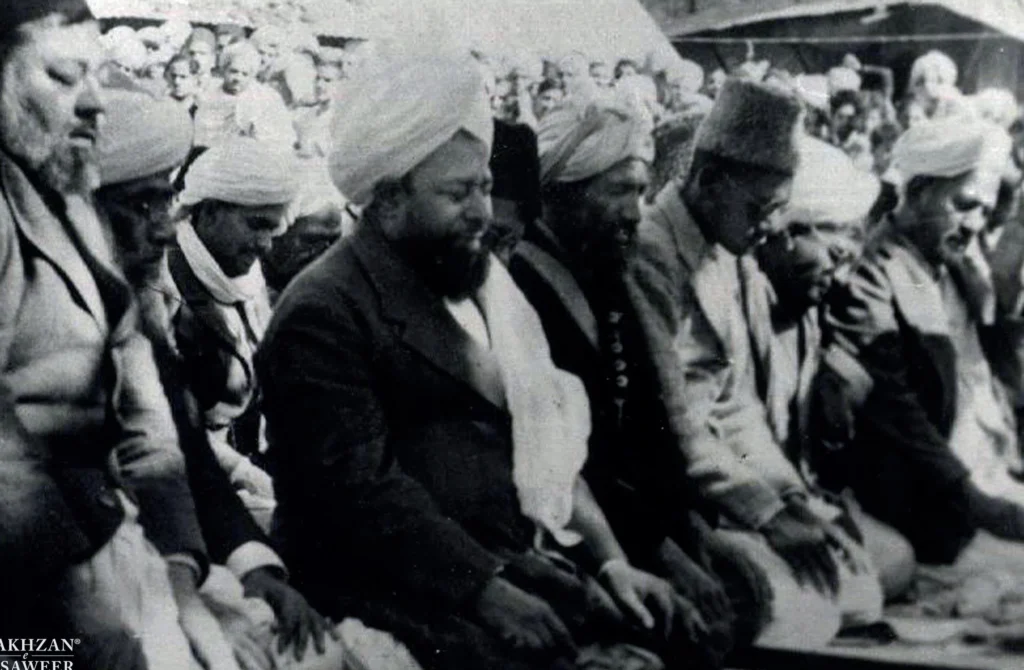AYESHA MAQSOOD, BANGALORE
FEBRUARY 20, 2024
God is recognised through His attributes. His existence resonates in every particle of the universe. However, nothing serves as more compelling evidence for His being than those who imbibe Divine attributes to such an extent that their persons become the physical reflections of God’s existence. The prophets and messengers of God are at the forefront of such individuals, followed by their adherents, who act as the living embodiments of Divine virtues.
Such was the person of Hazrat Mirza Bashiruddin Mahmud Ahmadra, the Second Caliph of the Ahmadiyya Muslim Community, who is known as Musleh Maud, or the Promised Reformer. Like a blooming flower born from a whispered wish, Musleh Maudra signifies the Divine response to the heartfelt pleas of Hazrat Mirza Ghulam Ahmadas, the Promised Messiah. The prophecy foresaw the birth of a special son to Hazrat Ahmadas, who would significantly aid in his cause of reviving faith and Islam.
The life of Hazrat Musleh Maud stands as a testament to the truth of Islam and the truthfulness of the Promised Messiahas. The achievements of Musleh Maud in spreading the message of Hazrat Ahmadas are seen as a direct answer to his prayers for the advancement of Islam.
Scholarly contributions
Hazrat Musleh Maud’s profound devotion to God was remarkable. He was incredibly honest and committed to his faith, always seeking truth no matter what. While he is known for his great accomplishments, profound devotion was the driving force behind his remarkable achievements. Fuelled by faith, he accomplished great things while remaining grounded in humility and piety.
At the young age of 25, he was chosen as the Second Khalifa of the Community and held this position for 52 years. Hazrat Mirza Bashiruddin Mahmud Ahmadra possessed a remarkable understanding of the Holy Quran. He wrote two commentaries: Tafsir-e-Saghir (translation and short commentary) and Tafsir-e-Kabir (The Grand Exegesis). These exegeses thoroughly explore the meanings of Quranic verses, offering detailed insights to help readers understand the Divine text better. Through meticulous analysis and scholarly interpretation, he illuminated the teachings and wisdom of the Quran, making its message accessible to a wider audience and enriching the spiritual understanding of believers.
Being an eloquent orator and a prolific writer, Hazrat Musleh Maud delivered numerous addresses and authored over a hundred books, addressing a wide range of theological, philosophical, and social issues. His works encompass topics such as the interpretation of the Quran, the life of the Holy Prophetsa and the philosophy of Islamic teachings in the contemporary world.
Nevertheless, Hazrat Musleh Maud’s scholarly contributions were not limited to doctrinal or religious matters. Rather, he delved into discussions on global peace, interfaith dialogue, and the role of religion in fostering harmony. His writings also reflect his comprehensive and nuanced understanding of the complex issues facing society.
His scholarly works have stood out as unparalleled within the Islamic world, setting a standard of excellence that few have been able to surpass. Through meticulous research, profound insights, and articulate expression, his writings have left an indelible mark on Islamic scholarship.
Organisational leadership
Hazrat Musleh Maudra played a pivotal role in establishing the organisational framework of the Ahmadiyya Muslim Community. He laid the foundation for various auxiliary groups within the Community, such as Lajna Imaillah (women’s auxiliary), Ansarullah (the elderly men’s auxiliary), Khuddamul Ahmadiyya (young men’s auxiliary), Nasiratul Ahmadiyya (young girls’ auxiliary), and Atfalul-Ahmadiyya (young boys’ auxiliary). These auxiliary organisations were designed to cater to the specific needs and interests of different segments within the Ahmadiyya Muslim Community, fostering a sense of unity, service, and spiritual development among its members.
Through his foresight and leadership, Hazrat Musleh Maudra ensured that the Community had a well-organised structure to effectively fulfil its mission and serve society at large.
His groundbreaking contributions remain a beacon of inspiration and knowledge for future generations. He established initiatives like the Tahrik-e-Jadid scheme to intensify missionary work in foreign countries and the Waqf-e-Jadid scheme to spread education and religious knowledge to rural populations. He also spearheaded the creation of a research institute in Qadian, and following the partition of India in 1947, he facilitated the construction of a similar institute in Rabwah.
A profound source of guidance
Hazrat Musleh Maud’s most significant contribution to Islam was his leadership as the Second Caliph of the Ahmadiyya Muslim Community. With wisdom, foresight, and deep spiritual insight, he guided the Community through challenging times, ensuring its growth and stability. His leadership provided a beacon of guidance and inspiration for millions of believers worldwide, fostering a sense of unity, purpose, and devotion to Islam.
Beyond the confines of the Ahmadiyya Muslim Community, Musleh Maud’s influence extended far and wide, inspiring people from all walks of life to embrace the values of compassion, tolerance, and peace.
In essence, Musleh Maud’s leadership was not just about managing the affairs of the Community but about illuminating the path of righteousness and spirituality for believers around the globe. His legacy continues to inspire generations, reminding us of the timeless principles of love, service, and unity that define true Islamic leadership.
He left an indelible mark on the history of Islam through his visionary leadership, intellectual contributions, and unwavering commitment to the values of peace, justice, and service. His legacy serves as a source of inspiration and guidance for Muslims around the world, reminding us of the profound impact that one individual can have in advancing the cause of Islam and promoting the welfare of humanity.
The author …..













0 Comments